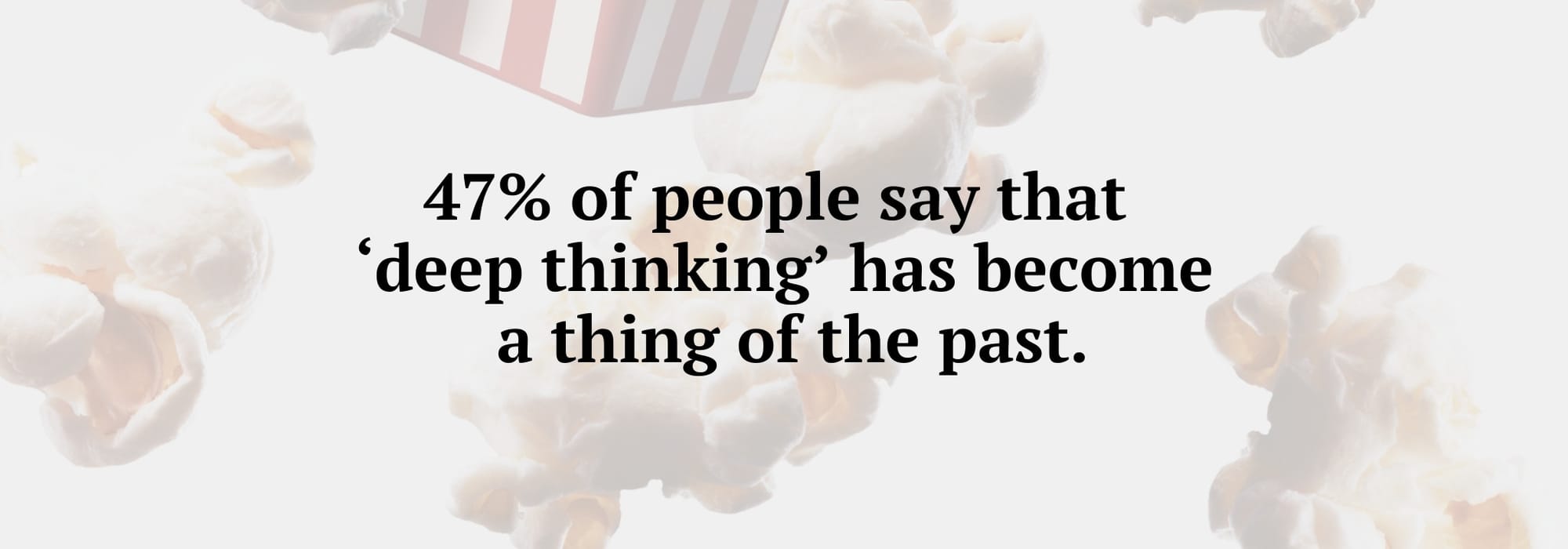If you struggle to focus, have scattered thoughts, and get easily distracted – you could be experiencing ‘popcorn brain’. Here, we explain what it is, and how you can simmer down when focus seems impossible
“Starve your distractions, feed your focus,” says psychologist and author, Daniel Goleman. Nice idea, right? But it turns out that the ability to stay focused is something that many of us are finding increasingly difficult.
This is never more true for me than when I have household chores to complete. Just yesterday, I started tidying the living room, only to get sidetracked when I noticed my shiny new dumbbells. Inspired to workout, I switched to hunting for clean gymwear, then to putting dirty clothes in the washing machine, then to scrolling online for new leggings. Before I knew it, I was surrounded by damp laundry, £50 out of pocket, and no further forward with my cleaning mission.
If my aversion to tidying holds a kernel of truth for you, it may be that you too are experiencing a state of mind which is informally referred to as ‘popcorn brain’ – characterised by scattered thoughts, fragmented attention, and an urge to switch between topics, similar to the erratic popping of corn kernels in a pot. It’s also accompanied by mental overload, increased stress, fatigue, and anxiety.
According to a 2024 PPL PRS survey of 2,000 Brits, workers (whether at home, office, or hybrid) lose up to 15 hours a week to distractions. Worryingly, a separate survey by the Policy Institute and Centre for Attention Studies at King’s College London revealed that 49% of the UK public say they feel like their attention span is shorter than it used to be, and 47% say that ‘deep thinking’ has become a thing of the past.

So, what’s causing all this pressure, and making our brains metaphorically ‘pop’? David M Levy, a computer scientist at the University of Washington who coined the term popcorn brain, said that it was a result of “being so hooked on electronic multi-tasking that the slower paced life offline holds no interest”.
The sheer volume of information available at our fingertips means that when a thought arises (e.g. I’d like some new gym leggings) we don’t have to put the task on hold. We can go online and get the dopamine hit of searching and finding what we need. This, along with digital notifications, and constant connectivity, means we’re regularly pulled into the endless stream of the digital world without conscious consent.
But social media is just one piece of the puzzle. Psychotherapist Tina Chummun notes that financial pressure, burnout, and emotional dysregulation can create the conditions for popcorn brain. “Your brain isn’t designed to function well in constant fight-or-flight mode. When cortisol is persistently high, the prefrontal cortex (the part of the brain that governs decision-making and attention) goes offline, leaving us scattered and reactive.
“Whether it’s unprocessed emotions from earlier in the day, or way back in childhood, these can clutter our mental headspace. This can be especially common in people who’ve experienced enmeshment trauma or perfectionist upbringings, where their mind is always on full alert.”
There’s also lifestyle factors to consider. “Skipping meals or eating foods that spike and crash blood sugar levels can directly affect our mental clarity,” says Tina. “Being dehydrated has the same effect, too. Your brain needs consistent fuelling, not just caffeine and chaos.”
Without adequate rest, Tina says your brain is unlikely to function optimally. “Not just poor sleep, but a lack of mental downtime can affect the brain. Even moments we think are restful – like scrolling, binge-watching, or multi-tasking – often keep our brain in a state of low-grade stimulation that prevents real cognitive reset.”
If this all sounds familiar, you would be forgiven for thinking that it’s not popcorn brain you’re experiencing, but instead, symptoms of attention deficit hyperactivity disorder (ADHD). And while there is certainly an overlap, Tina explains that ADHD is normally present (even if undiagnosed) from a young age, and affects functioning across multiple areas (e.g. home, school, relationships) and doesn’t simply ‘switch on’ when life gets hectic.
“Popcorn brain is usually situational,” explains Tina. “It tends to emerge during periods of stress, emotional upheaval, information overload, or major lifestyle changes.”
So, how can you really tell the difference? Ask yourself if your focus improves in calm, low-stimulation environments. If the answer is yes, then it’s likely you may be responding to overstimulation, rather than experiencing a neurological difference. When in doubt, speak to your GP about getting a formal assessment.
That aside, here are some of Tina’s top tips to turn down the heat when your brain is working overtime…
Mind map method
Instead of letting your distractable mind call the shots, take a moment to catch all those kernels that are popping off. Make a mind map by writing down everything that’s on your brain: appointments, worries, conversations, to-dos, emotional niggles. Write them in any order without the pressure to organise it just yet.
“Once everything is out of your head and on to the paper, start grouping these into areas of your life – e.g. work, home, emotional wellbeing, future plans,” suggests Tina. “Then ask yourself: what matters now? What can wait? This creates order, and gives your brain permission to focus, as well as the opportunity to remember everything.”

Three-second pause
Every time you switch tasks, reach for your phone, or feel your thoughts becoming scattered, take a pause. “Breathe in. Name what you’re feeling. Then reorient yourself,” says Tina. “Trauma responses are when your body is in survival mode, and that involves ‘acting fast’. This micro-practice [...] enhances your awareness, enabling you to slow down and emotionally regulate.”
Minimise tech
A true digital detox is unrealistic for most of us. Instead, try ‘focus blocks’ consisting of 25–30 minutes away from screens, followed by a five-minute reward scroll. “This teaches your brain to tolerate stillness, without feeling punished or deprived,” says Tina.
Reclaim boredom
Allow space in your day for doing nothing. This may feel excruciatingly boring at first, because popcorn brain likes to be ‘go go go’ in an attempt to feel safe. “Go for a walk without music. Cook without a podcast. Stare out of your window and notice what you can see,” suggests Tina. “Sit in silence and observe your thoughts. Let your brain breathe. Doing nothing is sometimes doing exactly what your nervous system and body needs.”


Comments